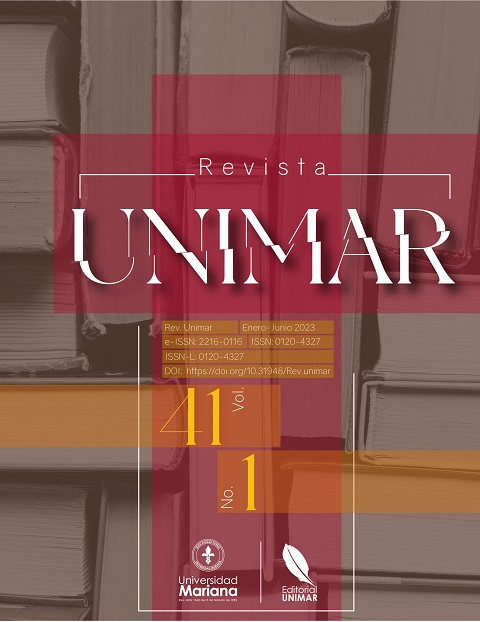Compreensão de leitura em alunos da sétima série através da literatura afro-colombiana
DOI:
https://doi.org/10.31948/Rev.unimar/unimar41-1-art5Palavras-chave:
compreensão da leitura, simbolismo, literatura afrocolombiana, identidade culturalResumo
A compreensão da leitura significa entender o que é lido; envolve a capacidade de extrair informações explícitas e implícitas do texto. É uma capacidade de ordenar ideias e construir relações dentro do que está escrito. O estudo partiu dessa concepção epistêmica, cujo objetivo foi promover a compreensão leitora mediada pela literatura afro-colombiana de Mary Grueso, como estratégia didática com alunos da sétima série. Metodologicamente, o estudo foi enquadrado no paradigma pós-positivista, sob o método da pesquisa-ação pedagógica. Uma prova escrita e um diário de observação foram usados como instrumentos. Os resultados indicaram que, com a estratégia, os alunos compreenderam os textos lidos, fizeram inferências e argumentações sobre um tema, tendo coerênciano discurso. Da mesma forma, conseguiram aumentar suas habilidades de comunicação e sua fluência de leitura, além de ampliar seu vocabulário por meio do uso do dicionário, ao encontrar termos desconhecidos.
Biografia do Autor
Lohorquis Esther Cuello Cuello, Institución Educativa Bello Horizonte, Valledupar-Cesar, Colombia.
Master in Pedagogy. Professor at Bello Horizonte Educational Institution, Valledupar-Cesar, Colombia.
Leonardo Enrique Martínez Arredondo, Universidad del Cesar
Doctor in Sciences of Education. Professor.
Gustavo Adolfo González Roys, Universidad Mariana
Doctoral student in Education IUAC, Mexico. Research Coordinator of the Master’s program in Pedagogy, Universidad Mariana, Valledupar, Colombia.
Referências
Acosta, A. (Coord.). (2006). How to analyze discourse types: theoretical study and practical application: selection of texts for commentary. Editorial Fundación ECOEM.
Actos en la escuela. (n.d.). Reading comprehension and its characteristics. https://actosenlaescuela.com/comprensionlectora/
Adam, J. & Lorda, C. (1999). Linguistics of narrative texts. Ariel.
Afrofemeninas. (2019, April 19). Some AfroColombian women writers you should know and read. https://afrofeminas.com/2019/04/19/algunas-escritoras-afrocolombianas-quedeberias-conocer-y-leer/
Avilés, H. (2020). Teaching sequence based on Hot Potatoes, McDonals’S and JCLIC to strengthen critical reading in the subject of economics and politics in 11th grade [Master’s Thesis, Universidad de Santander]. Udes Digital Repository. https://repositorio.udes.edu.co/handle/001/6277
Badilla, L. (2006). Fundamentals of the qualitative paradigm in educational research. Pensar en movimiento, Revista de Ciencias del Ejercicio y la Salud, 4(1), 42-51. https://doi.org/10.15517/pensarmov.v4i1.411
Baquero, M. (2018). Didactic design to enhance reading comprehension through dramatic play in grade 4-1 of Institución Educativa Rafael Valle Meza, headquarater Mixta 3, Valledupar Cesar [Master’s Thesis, Universidad Santo Tomás]. CRAIUSTA. http://hdl.handle.net/11634/16415
Cassany, D., Luna, M., & Sanz, G. (2001). Teaching of language. Graó.
Cassany, D. (2004). Exploring current needs for understanding. Approaches to critical understanding. Lectura y Vida, 25(2), 6-23. http://hdl.handle.net/10230/21237
Del Valle, M. (2012). Variables affecting the acquisition of reading habits by students. Dirección General de Evaluación e Investigación Educativa –DIGEDUCA–. https://www.mineduc.gob.gt/digeduca/documents/investigaciones/habitos-lectura.Pdf
De la Cruz, L. (2012, February 1). 50% of students have poor reading comprehension. El Heraldo. https://www.elheraldo.co/local/50-de-estudiantes-tienen-baja-comprensionde-lectura-55306
Dios-Arrieta, J. & Llamas-Rodríguez, O. (2020). Learning social sciences through the problematizing question. Revista Unimar, 38(2), 173-198. https://doi.org/10.31948/Rev.unimar/unimar38-2-art7
Dugarte, A. (2006). Rethinking in new-age educational research. Revista Ciencias de la Educación, 1(27), 99-108. http://servicio.bc.uc.edu.ve/educacion/revista/volIn27/27-6.pdf
Gamboa, M. (2017). Development of reading comprehension using Solé strategies in children of the second grade ‘A’ of the educational institution No. 1249 Vitarte UGEl No. 6. [Specialization work, Universidad Peruana Cayetano Heredia]. Institutional Repository. https://hdl.handle.net/20.500.12866/3717
García, S. (2014). Teacher mediator role in text comprehension. Enunciación, 19(2), 252- 257. https://doi.org/10.14483/udistrital.jour.enunc.2014.2.a06
Gutiérrez-Braojos, C. & Salmerón, H. (2012). Reading comprehension strategies: teaching and assessment in primary education. Profesorado. Revista de Currículum y Formación de Profesorado, 16(1), 183- 202. https://www.redalyc.org/articulo.oa?id=56724377011
Hernández, R., Fernández, C., & Baptista, P. (2014). Research Methodology (6th ed.). McGraw Hill Educación.
Mera, A. (2012, February 5). Students in Colombia read, but don’t understand. El País. https://www.elpais.com.co/colombia/alumnos-en-leen-pero-no-entienden.html
Martínez, L. (2007). Observation and field diary in the definition of a research topic. Revista Perfiles Libertadores, (4), 74-80. https://www.ugel01.gob.pe/wp-content/uploads/2019/01/1-La-Observaci%C3%B3ny-el-Diario-de-campo-07-01-19.pdf
Martínez, M. (2006). Science and art in qualitative methodology. Trillas.
Ministerio de Educación Nacional (MEN). (2008). Diagnostic evaluation guidelines and instruments. Ministerio de Educación Nacional.
Ministerio de Educación Nacional (MEN). (2014). Evaluation of competencies for the promotion or relocation of salary levels in the teaching professionalization scale for teachers and managers governed by Decree Law 1278 of 2002. https://www.mineducacion.gov.co/1759/articles-342767_recurso_nuevo_20.pdf
Moreno, D. & Herrera, Y. (2017). The teaching and learning of reading and writing mediated by stories of Afro-Colombian literature in the 3rd grade of primary school at the Luis Carlos Valencia School, Camilo Torres rural area of the municipality of Jamundí (Valle del Cauca) [Undergraduate Thesis, Universidad de San Buenaventura]. Institutional Repository. http://hdl.handle.net/10819/4772
Mosquera, J. (2006). Ethno-education and AfroColombian studies in the school system. Educación virtual. http://www.lablaa.org/blaavirtual/sociologia/cimarron/cimarron3.htm
Ojeda, M. (2016). The story as a didactic strategy for the reading comprehension of the students of Escuela Agustín Constante del Pelileo [Undergraduate Thesis, Universidad Técnica de Ambato]. Universidad Técnica de Ambato Repository. http://repositorio.uta.edu.ec/jspui/handle/123456789/23115
Pinzas, J. (2012). Meta-cognitive strategies to improve reading comprehension. Editorial Barcelona.
Rentería, N. M. (2018). The teaching of reading comprehension through Afro-Chocoan stories in fifth-grade elementary school students. Revista Educación y Ciudad, (35), 93- 102. https://doi.org/10.36737/01230425.v0.n35.2018.1965
Restrepo, B. (2006). Pedagogical action research, a variant of Educational Action Research that is being validated in Colombia. Revista de la Universidad de La Salle, (42), 92-101. https://ciencia.lasalle.edu.co/ruls/vol2006/iss42/11/
Rojas, A. (2008). The test in the first year of general basic education. Ministerio de Educación Pública. https://mep.janium.net/janium/Documentos/10744.pdf
Rojas, A. (2015, November 16). Quantitative and qualitative paradigms and research methodology [Blog]. http://investigacionmetodologicaderojas.blogspot.com/2015/11/paradigmas-cuantitativo-ycualitativo-y.html
Santiesteban, E. & Velázquez, K. (2012). Reading comprehension from a didacticcognitive perspective. Didasc@lia: Didáctica y Educación, 3(1), 103-110. https://revistas.ult.edu.cu/index.php/didascalia/article/view/78
Vaello, J. (2009). The emotionally competent teacher. A bridge over turbulent classrooms. Grau.
Valencia, C. & Osorio, D. (2011). Strategies to promote the pleasure and habit of reading in the first cycle [Undergraduate Thesis, Universidad Libre]. Unilibre. https://hdl.handle.net/10901/6039
Vargas, L. (2003). Poetics of the Afro-Colombian hairstyle [Undergraduate Thesis, Universidad Nacional de Colombia]. Digital Archive. https://jaimearocha.files.wordpress.com/2015/06/poc3a9tica-del-peinadoafrocolombiano.pdf
Vargas, Z. (2009). Applied research: a way to learn about realities with scientific evidence. Revista Educación, 33(1), 155-165. https://doi.org/10.15517/revedu.v33i1.538
Velandia, R. (2010). About the discourse and narrative on the construction of Afro identity in Colombia. A communicational analysis [Undergraduate Thesis, Pontificia Universidad Javeriana]. PUJ Repository. http://hdl.handle.net/10554/5428
Villa, J. (2018). Text and pretexts to improve reading comprehension. Application of cognitive-discursive strategies to strengthen reading comprehension with seventh-grade students in the educational institution Fe y Alegría La Cima, in Medellín [Master’s Thesis, Universidad de Medellín]. Institutional Repository. http://hdl.handle.net/11407/4966
Como Citar
Downloads
Publicado
Edição
Seção
Licença

Este trabalho está licenciado sob uma licença Creative Commons Attribution 4.0 International License.
Los autores que publiquen en esta revista aceptan las siguientes condiciones:
1. Los autores conservan los derechos de autor y ceden a la revista el derecho de la primera publicación, con el trabajo registrado con la licencia de atribución de Creative Commons, que permite a terceros utilizar lo publicado siempre que mencionen la autoría del trabajo y a la primera publicación en esta revista.
2. Los autores pueden realizar otros acuerdos contractuales independientes y adicionales para la distribución no exclusiva de la versión del artículo publicado en esta revista (p. ej., incluirlo en un repositorio institucional o publicarlo en un libro) siempre que indiquen claramente que el trabajo se publicó por primera vez en esta revista.
3. Se permite y recomienda a los autores publicar su trabajo en Internet (por ejemplo en páginas institucionales o personales) antes y durante el proceso de revisión y publicación, ya que puede conducir a intercambios productivos y a una mayor y más rápida difusión del trabajo publicado (veaThe Effect of Open Access).
| Métricas do artigo | |
|---|---|
| Vistas abstratas | |
| Visualizações da cozinha | |
| Visualizações de PDF | |
| Visualizações em HTML | |
| Outras visualizações | |








